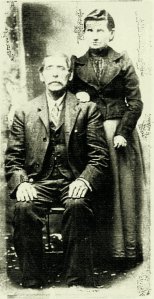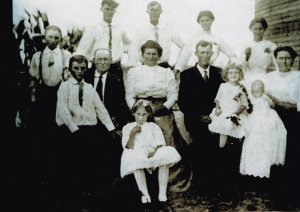The answer?
Never, at least that I know of, until now.
America has long been called (unless it is no longer politically correct to do so) as the "great American melting pot." Anyone else remember the History Rock video of the same name (before videos were cool). A melting pot, of course, is a mish mash of different cultures coming together to form one. You could say it made us stronger and part of a whole, rather than weaker and separate.
My great-grandparents, Dominick and Elizabeth (Dietz) Hechler came to America from Russia (although they were 100% German - another story for another day) in 1890. I was told several times in asking stories of my family how they were PROUD to be here. They first landed at Castle Garden in New York (the forerunner of Ellis Island), but eventually ended up in Plantersville, Texas, with other families who had come with them. (I have written about them in my book I Will Go With You: The Hechlers, From Germany to Russia to America.)
The story was often told, but was told to me by Tilly Gaetz Hechler, wife of August Hechler who came with his parents from Russia, of how the school teacher came to my great-grandparents and told them they needed to start speaking English at home for the sake of the children. They were now Americans and lived in America and people here spoke English. My great-grandfather, who around this time was also naturalized and became a US citizen, did so. He was proud to be an American. He was grateful to be here, and he had no qualms speaking like an American and becoming part of the "melting pot" of this country. He even did so as he pressed for his oldest grandchild to be named Wilhelm, a very German name.
It is worthy of note, that my grandmother refused to do so. Was it calculated on their part for one to learn to speak English and the other to not so the children would learn both languages? Or did my great-grandmother simply refuse to learn for some reason? I do not know, nor is anyone alive who remembers. It was one of those questions one never ponders as a child, and then later it is too late to ask when it is thought of.
Culture is more than the language a person speaks. Its their favorite foods, the folk music, oftentimes their ideas and religion. This is what homes are for. This is what parents and grandparents are for - to imbue a sense of the past into their offspring. If they choose to speak their native language at home, that is fine. But to come into a country and insist that country become bilingual is nonsense. They are not becoming a part of the "great melting pot," but setting up their own pot on a side burner.
I oftentimes heard stories of how my grandfather, D. J. Hechler, would go next door to the Wagners, another family that came with them from Russia, and how he and the older man would speak in German. And yet, my grandfather spoke English fluently as well. In fact, my grandmother, his wife, Eleanora Ressler Hechler, spoke English, but with her sisters spoke Czech. Neither one of my grandparents graduated high school, but they were bilingual. I cannot even boast of such skills today.
I have often heard the argument that immigrants do not wish to lose their identity as a culture. But why should they expect to leave their native land, come to another, and not lose something in the assimilation process? Did my great-grandfather, in coming here, give up his German roots? Sure, some. A person cannot move halfway around the world, or into another continent, and not lose something of their former way of life. Did my great-grandparents know this and chose that fate any way? Yes, because to stay in Russia was to continue to endure persecutions and the loss of their way of life. A loss that was harsher than moving to another country and becoming, in a sense, a hybrid of that culture.
But the thing of it is, they expected to do nothing so, for they were desperate to improve their lot and America offered them that chance. If America offers such a chance now to others, then those people who come should expect to be Americans, and that means learning OUR language, just like all other immigrants before them have done for hundreds of years.
That is what makes the melting pot strong.


